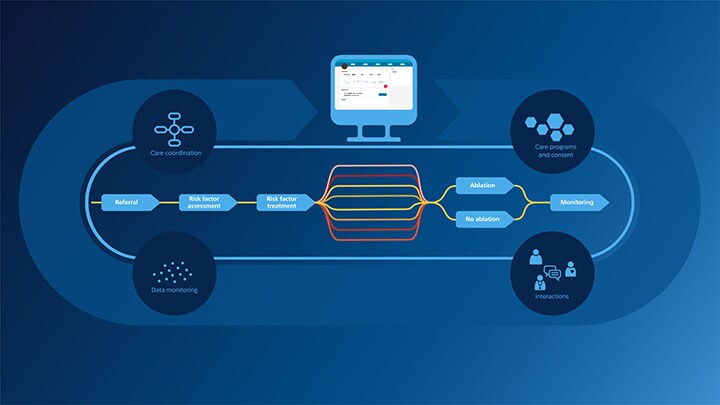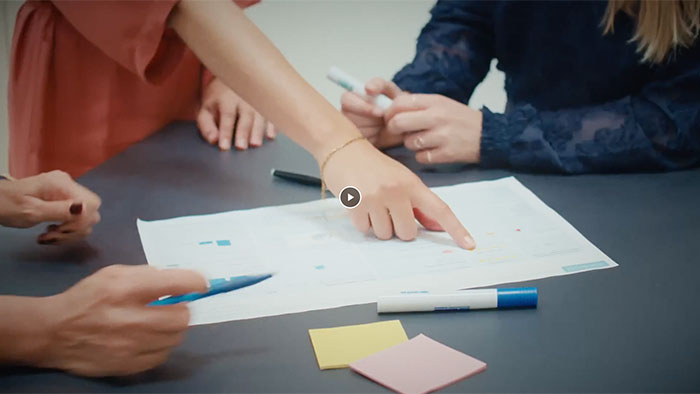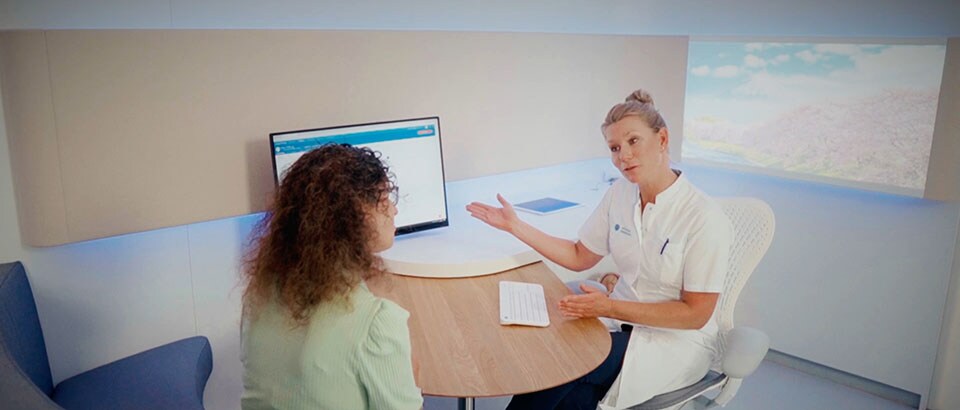Ongeveer twee procent van de wereldbevolking lijdt aan boezemfibrilleren, een hartritmestoornis die een onregelmatig en snel hartritme veroorzaakt. De behandeling is vaak deels succesvol: een groot deel van de patiënten krijgt binnen een jaar last van terugkerende klachten. Een team van artsen van het Catharina ziekenhuis bekeek samen met Philips Designers de behandeling eens vanuit een heel ander perspectief en ontwierp een traject om leefstijlfactoren gelinkt aan boezemfibrilleren te behandelen. Van 21 tot 29 oktober tonen de Philips Designers hun project “Close to Heart” in het Philips Museum tijdens Dutch Design Week.
Een traject voor patiënt en zorgverlener
Als Philips Designer, redeneer je vanuit de wensen van de doelgroep om een oplossing te ontwerpen. In het project “Close to Heart” ging het team samen met artsen en verpleegkundig specialisten in het Catharina ziekenhuis op zoek naar betere gezondheidsresultaten voor patiënten met boezemfibrilleren. Om het traject te kunnen ontwerpen, moest allereerst het bestaande zorgpad in kaart gebracht worden, om vervolgens de stappen in het nieuwe zorgpad te ontwerpen. “Dit betekent dat we vanuit de patiënt redeneerden wat voor informatie ze op welke momenten nodig hadden. Maar we hebben ook nagedacht over ervaring voor de zorgverleners, en hoe het platform kan ondersteunen in het verlichten van de werkzaamheden,” aldus Anne Wil Burghoorn, Design Researcher bij Philips. Het resulteerde in een nieuw zorgpad ondersteund door een digitaal platform, inclusief coaching, thuis monitoring, dataverwerking en een digitaal dagboek.
Terugkerende klachten
Hoewel niet direct levensbedreigend, is er wel een verhoogde kans op beroerte en hebben patiënten vaak klachten van vermoeidheid, hartkloppingen of pijn. Wanneer medicijnen niet werken kunnen patiënten behandeld worden met behulp van katheterablatie. Hierbij worden littekens in het hartweefsel gemaakt op de plek waar de ritmestoornis ontstaat, waardoor de extra prikkels geblokkeerd worden. “De huidige behandeling van boezemfibrilleren is deels succesvol”, aldus Lukas Dekker, Cardioloog in het Catharina Ziekenhuis. “Tot 30% van de patiënten ervaart een terugkeer van de klachten na katheterablatie”.
Niet de symptomen, maar de oorzaak behandelen
Om dit percentage te verminderen en ook om de kwaliteit van leven verder te verbeteren, ontwierpen Philips designers samen met cardiologen en verpleegkundig specialisten van het Catharina ziekenhuis een nieuwe polikliniek, met een zorgpad en digitaal platform. In deze nieuwe kliniek wordt de patiënt gedurende maximaal zes maanden behandeld op leefstijlfactoren alvorens zij een ablatie ondergaan. “De meest voorkomende oorzaken van hartritmestoornissen zijn leefstijl gerelateerd. Denk hierbij aan overgewicht, fysieke inactiviteit en hoge bloeddruk,” legt Tineke Vinck, Verpleegkundig Specialist Hart en Vaatcentrum in het Catharina Ziekenhuis, uit. “Met deze zorg begeleiden we patiënten in hun leefstijl, waardoor terugkeer van hartritmestoornissen na een ablatie verminderd kan worden of in het beste geval, een ablatie in de toekomst zelfs niet meer nodig is.” Het concept wordt nu getest in een klinische omgeving.

Prijswinnend design tijdens Dutch Design Week
Het “Close to Heart” project leverden de designers een IF Design Award op in de categorie “Professional Concept 2023”. De IF Design Awards staan bekend als een van de belangrijkste en meest prestigieuze Design Award wereldwijd.
Tijdens de Dutch Design Week ontmoet je de Philips designers achter het project “Close to Heart”. Bezoek het Philips Museum tussen 21 en 29 oktober of schrijf je in voor de Online Design Talk op 26 oktober en leer meer over de ervaringen en lessen van de top designers bij Philips. Meer informatie over de Philips projecten tijdens Dutch Design Week, vind je hier.
e/MTIC Samenwerkingsverband
Het “Close to Heart” project wordt uitgevoerd binnen het samenwerkingsverband e/MTIC, het Eindhoven MedTech Innovation Center. Het project is onderdeel van het Topzorg programma van het Ministerie van ZonMW. Binnen e/MTIC werken de TU/e, het Catharina ziekenhuis, Maxima Medisch Centrum (MMC), het Kempenhaeghe Slaapcentrum en Philips samen aan diverse onderzoeken rondom de onderwerpen cardiovasculaire, perinatale en slaap geneeskunde. Met als doel de implementatie van nieuwe gezondheidstechnologie te versnellen.


Dutch Design Week: Designing a new care pathway from the needs of the patient
About two percent of the world's population suffers from atrial fibrillation, a heart rhythm disorder that causes irregular and rapid heart rhythms. Treatment is often partially successful: a large part of patients develop recurrent symptoms within a year. A team of doctors at Catharina Hospital, together with Philips Designers, looked at the treatment from a completely different perspective and designed a pathway to treat lifestyle factors linked to atrial fibrillation. From October 21 to 29, the Philips Designers will show their project "Close to Heart" at the Philips Museum during Dutch Design Week.
A journey for patient and caregiver
As a Philips Designer, you reason from the wishes of the target group to design a solution. In the "Close to Heart" project, the team worked together with doctors and nurse practitioners at Catharina Hospital to find better health outcomes for patients with atrial fibrillation. To design the pathway, the existing care pathway had to be mapped, before the steps in the new care pathway could be designed. "This meant that we looked at the patient's needs on what type of information they needed at what times. But we also thought about experience for the caregivers, and how the platform could support in reducing the workload," said Anne Wil Burghoorn, Design Researcher at Philips. It resulted in a new care path supported by a digital platform, including coaching, home monitoring, data processing and a digital diary.
Recurring symptoms
Although not immediately life-threatening, there is an increased risk of stroke and patients often have complaints of fatigue, palpitations or pain. When medication fails, patients may be treated with catheter ablation. This involves scarring the heart tissue at the site of the arrhythmia, blocking the extra stimuli. "The current treatment of atrial fibrillation is partially successful," said Lukas Dekker, Cardiologist at Catharina Hospital. "Up to 30% of patients experience a return of symptoms after catheter ablation."
Treating the causes, not the symptoms
To reduce this percentage and to further improve the quality of life, Philips designers together with cardiologists and nursing practitioners at Catharina Hospital designed a new outpatient clinic, with a care path and digital platform. In this new clinic, patients are treated for up to six months on lifestyle factors before they undergo ablation. "The most common causes of cardiac arrhythmias are lifestyle related. These include obesity, physical inactivity and high blood pressure," explains Tineke Vinck, Nursing Specialist Cardiovascular Center at Catharina Hospital. "With this care, we guide patients in their lifestyle, which can reduce the return of cardiac arrhythmias after an ablation or, in the best case, even make an ablation unnecessary in the future." The concept is now being tested in a clinical setting.

Award-winning design during Dutch Design Week
The "Close to Heart" project earned the designers an IF Design Award in the "Professional Concept 2023" category. The IF Design Awards are known as one of the most important and prestigious Design Awards worldwide.
During Dutch Design Week, meet the Philips designers behind the "Close to Heart" project. Visit the Philips Museum between Oct. 21 and 29 or sign up for the Online Design Talk on Oct. 26 to learn more about the experiences and lessons learned by the top designers at Philips. More information about the Philips projects during Dutch Design Week, you can find here.
e/MTIC Collaboration
The "Close to Heart" project is being executed within the e/MTIC partnership, the Eindhoven MedTech Innovation Center. The project is part of the “Topzorg” program of the Ministry of ZonMW. Within e/MTIC, the TU/e, Catharina Hospital, Maxima Medisch Centrum (MMC), Kempenhaeghe Sleep Center and Philips are working together on various research projects around the topics of cardiovascular, perinatal and sleep medicine. With the aim of accelerating the implementation of new health technology.













